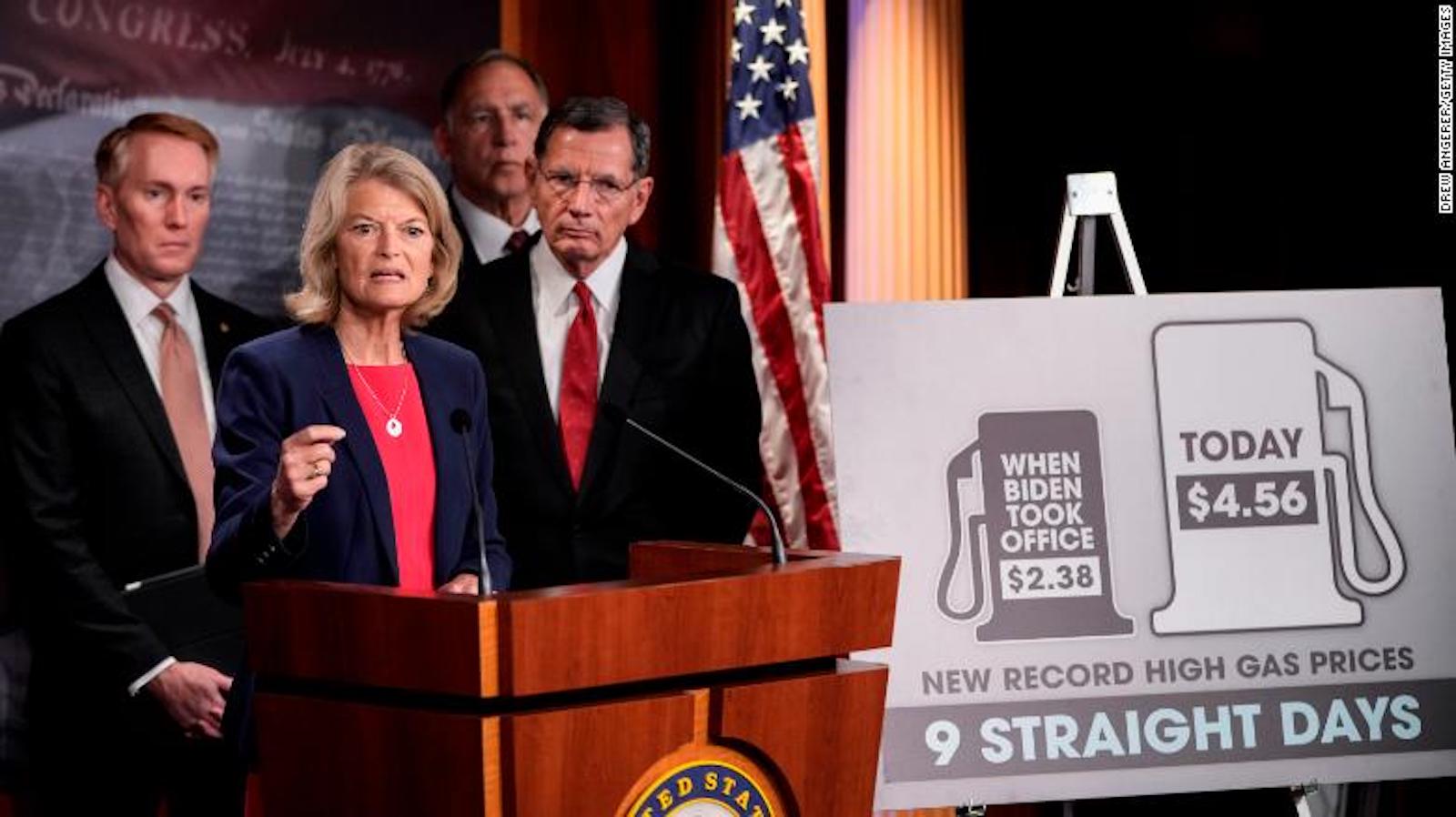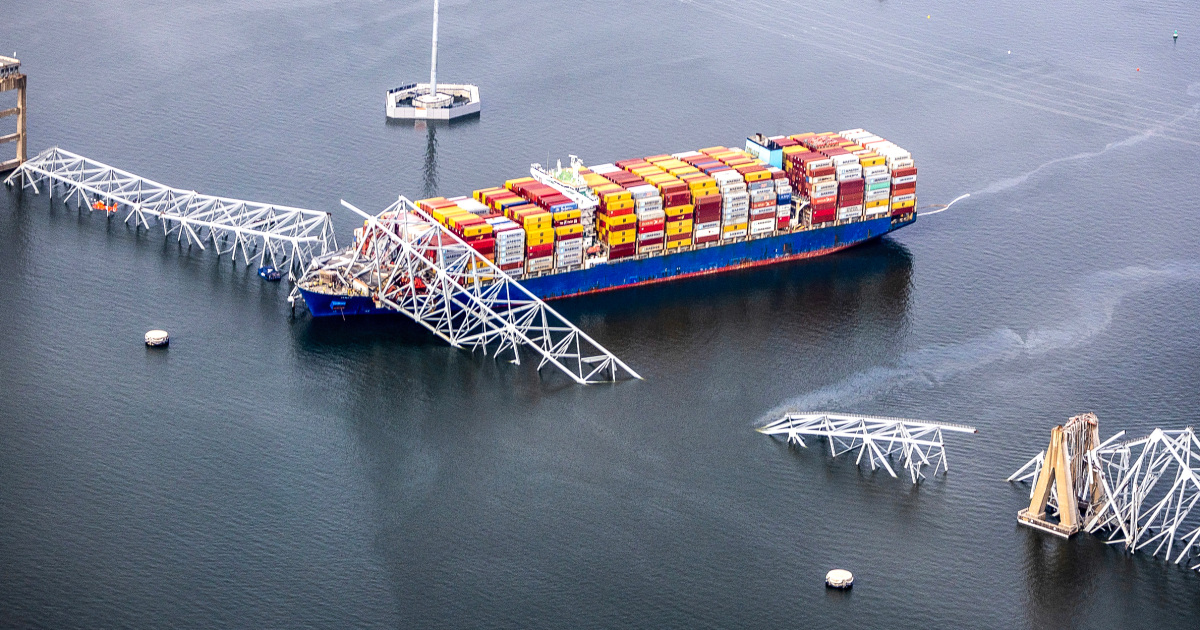US cracks down on baby formula shortage 0:45
(CNN) --
Empty shelves of baby formula.
Dreaded power outages in summer.
Stock crash.
Widespread gas price predictions of $6 per gallon.
recession clouds.
Coming food shortage.
Rising prices of groceries.
And the refusal of a pandemic to ease its control.
This current reality, mixed with predictions that the worst is yet to come, is hardly the normalcy that Americans yearned for.
And less the one that President Joe Biden promised last year when he said, shortly after taking office, that "America is back."
Yet there is a growing sense that crises are piling up as shockwaves from a period of unusual global upheaval, including a once-in-a-century pandemic and the worst war in Europe since 1945, bury themselves in the fabric of everyday life.
It all exudes a sense of pessimism and exhaustion among the American people, according to a CNN poll released this week that showed clear majorities worried about how things are going and burned by a toxic policy that seems incapable of solving the most fundamental questions facing the country. .
Yet for all the pessimism, this is also a time of strange duality in an economy that has, in many ways, recovered well from the pandemic shutdowns.
The unemployment rate is near 50-year lows.
Workers in high demand can dictate the terms when they get new jobs.
And the nation's indoor sports arenas are packed with fans cheering on NBA and NHL games that make the barren covid-era playoff "bubbles" a horrible memory, as cities return to life.
advertising
How the Biden administration is quietly looking at relations with Saudi Arabia and the United Arab Emirates to counter rising oil prices
How is the economic contraction in the US explained?
5:13
These bright spots in a country trying to find its place again tend to exacerbate the sense that we are living in a time of extremes, a state of being that is unsettling and stressful in itself.
Millions of Americans worry about how to deal with high prices, or are running out of them.
Predictions of a looming recession have everyone worrying about their jobs.
And any pay raise that comes with a new job is quickly eaten up by inflation.
The secondary consequences of such coercion are bound to be political.
And for Biden and the Democrats, already facing an excruciating midterm election year, the prospect of repudiation from angry voters is growing.
Almost by the day, the political environment is getting worse despite Biden's frantic efforts to convince the country that he feels its pain and can lead it to better times.
"I know families across America are hurting because of inflation," Biden said earlier this month.
"I understand how they feel," she added, insisting that the high cost of living was his "top internal priority."
What factors drive the stock market crash?
2:37
Biden is blamed for the economic blows
Presidents probably get too much credit when the economy is doing well.
The other side of the coin is that they get all the blame when things go wrong.
That is the plight of Biden right now.
But it's hard to navigate through scheduled presidential events and trips outside of Washington amid a barrage of bad news.
In the past week, for example, the president has touted the successes of his US bailout plan and announced measures to lower housing costs.
He has ordered the use of war powers to end the shortage of baby formula.
The White House is encouraging communities to unlock funds from Biden's bipartisan infrastructure act.
Still, the president's approval rating is languishing around 40% in most polls, amid questions about whether his administration really understands the challenges facing Americans and whether his administration is doing enough to fix them.
It is a dangerous political position when a president tries to highlight the positive aspects of an economy that many Americans believe is performing poorly.
The political impact of the current situation is not limited to the fate of Biden's party in the November midterm elections, which history suggests would be a rocky ride even without tough economic times.
A red wave in the midterm elections could bring a growing crop of pro-Trump extremist candidates to power in a way that could reshape the country in the long run.
Some of them, for example the newly appointed Republican candidate for governor of Pennsylvania, Doug Mastriano, have taken extreme positions on the 2020 voter fraud that pose serious challenges to the US political system itself.
A classic crisis that shakes the White House
The baby formula crisis is a classic example of the cascading problems that can consume presidencies.
There is nothing more distressing for a parent than a hungry baby.
And the very idea that babies could go hungry is a damaging metaphor for a country and a system that don't seem to be working.
It is also a powerful rallying point for Biden critics in the conservative media industry who suggest the country is on the brink of devastation.
Biden did not cause the baby formula problem.
It started when a baby food manufacturer closed a plant after several sick babies were linked to possibly contaminated formula.
But presidents are quickly saddled with crises that no one else has solved.
They take the blame when things go wrong and end up with little credit when the problem is finally resolved.
That is Biden's position now.
Another emotional issue that undermines national morale is the high price of gasoline.
The national average for a gallon of gasoline on Thursday was nearly $4.60, according to the American Automobile Association.
Come summer, that may seem like a bargain.
Financial services giant JPMorgan warned this week that California's $6-a-gallon hit could spread across the country in August.
High gas prices are a particularly painful blow to the wallet, especially in rural areas where many people drive miles to work.
Once again, Biden has tried to respond.
He released millions of barrels of oil from strategic reserves and has embarrassed the oil giants for not lowering prices more quickly.
But prices seem to keep going up.
And who hasn't looked for a scapegoat when the cost of filling a tank approaches $100?
In response to mounting public anger, the Democratic-controlled House of Representatives passed a bill on Thursday giving the Federal Trade Commission the authority to investigate energy companies for alleged price gouging.
But four Democrats joined Republicans in voting against it, with Rep. Stephanie Murphy, a Florida Democrat who is not running for re-election, criticized the move as a front.
"At best, this bill is a distraction that won't really address the problem," he said in a statement.
"In the worst case, it could make the problem more serious."
Why inflation spells political disaster
High inflation is giving Republicans an easy opening in the run-up to the midterm elections.
The White House's earlier insistence that the cost of living was a "transient" result of the pandemic will haunt her for months.
There is also little sign that pricing the real culprits, such as supply chain problems related to the pandemic and the war in Ukraine, will slow it down with voters weary of economic blows.
"President Biden's strategy of blaming inflation on a new villain every month is failing. First, he denied that inflation existed. Then, he called it temporary; and now, it's Putin's fault," said Rep. Jason Smith of Missouri. , the top Republican on the House Budget Committee, said at a hearing this week.
The bleak outlook for the White House is that while there are signs that inflation (which rose 8.3% in the 12 months ending in April) is slowing, there is no guarantee that things won't get worse in the coming months. to come.
The loss of a substantial part of Ukraine's harvest later this summer could have a devastating impact on prices and could make some staples scarce.
While the problem is likely to be most severe in developing countries, and could even cause famines, Americans are unlikely to be spared the consequences.
Aside from grain, Ukraine is also a major source of fertilizer and sunflower oil, the shortage of which will have a direct impact on food prices.
This was the week that inflation finally caught up with the stock market, which is critical to middle-class Americans' retirement savings, as lower-than-expected retail profits hit by consumer cutbacks made Wall Street turned around.
That coincided with new recession fears.
The Conference Board, a nonprofit business membership association, warned this week that 68% of CEOs surveyed think the Federal Reserve's strategy of raising interest rates to fight inflation will cause a slowdown.
Even a mild recession could have negative consequences for many Americans, not to mention devastating repercussions for Democrats in November.
If the outlook wasn't bleak enough, the North American Electric Reliability Corporation warned Thursday that extreme temperatures and drought could cause the power grid to collapse.
It looks like a long, hot and miserable summer that is unlikely to ease the country's disaffected mood.
Inflation



/cloudfront-eu-central-1.images.arcpublishing.com/prisa/MGXQCRPVF5E7IC2XTMDAP6ZWZ4.jpg)


/cloudfront-eu-central-1.images.arcpublishing.com/prisa/B42JEGVZNRCR3GWAER54BAPQZY.jpg)
/cloudfront-eu-central-1.images.arcpublishing.com/prisa/FIJVMOBHZRWVDBKS3NAQ2M4JRE.jpg)

